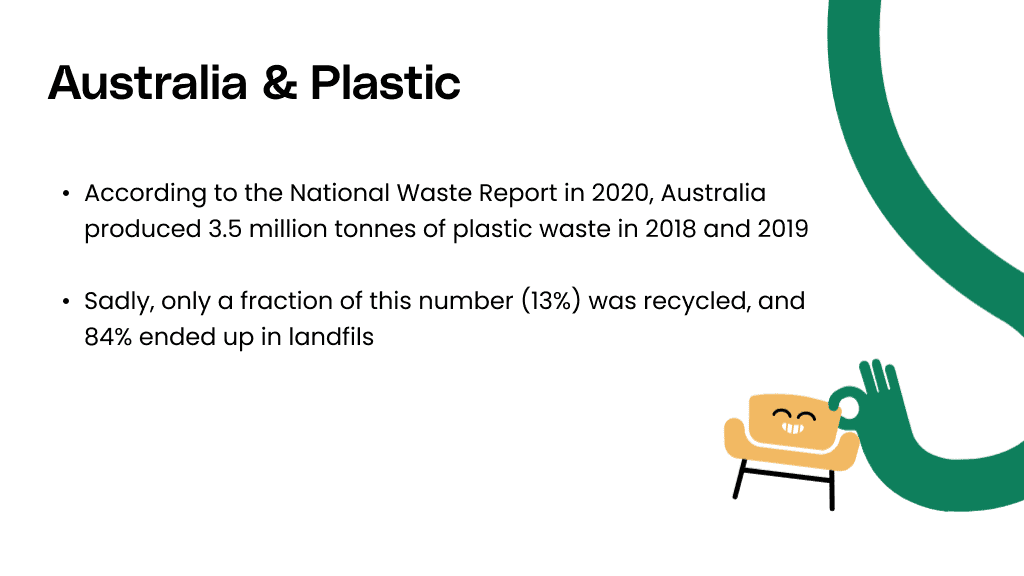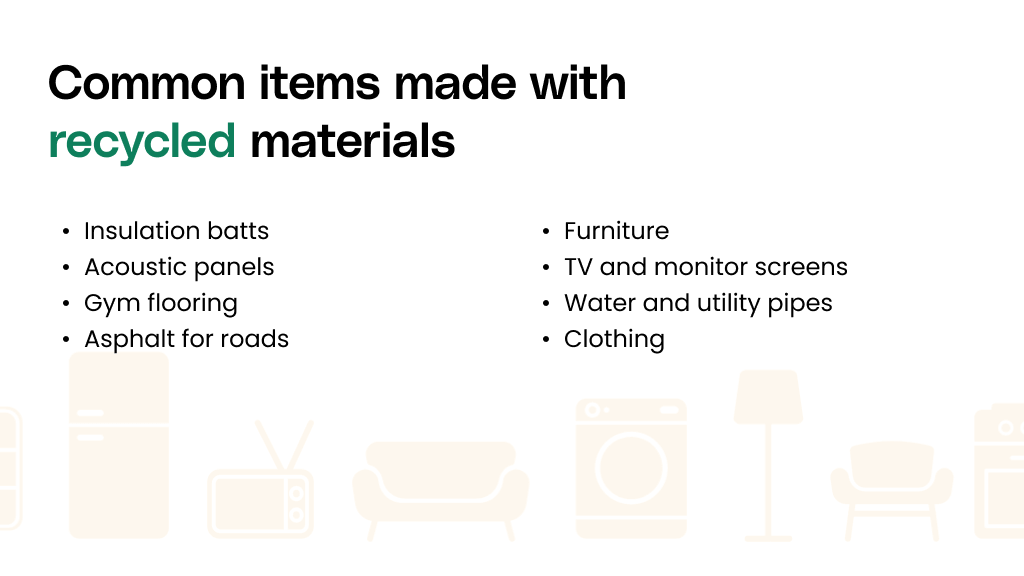
Humans produce a colossal amount of waste. According to the most recent statistics, Australia generated 76 million tonnes of waste, a 10% increase from the previous reporting year. Our massive amount of waste generated a whopping $17 billion expenditure on waste management services!
From these stats alone, you can see that how we dispose of our waste is incredibly important, as when waste is disposed of incorrectly, it can have disastrous consequences. Ridly will run you through our top 5 methods of waste disposal and how you can be more on top of your waste disposal management at home and in the office.
What Is Waste Management?
Waste management is the processes or actions required to control waste from creation to the final disposal. Waste control comprises the collection, transport, treatment, and disposal of any rubbish, coupled with the monitoring and regulation of waste disposal management processes and any waste-related laws and technologies.
5 Methods of Waste Disposal in Australia
1. Landfill
Just to be clear – we are not recommending landfill as a waste management method; just merely explaining that it is STILL the most common in Australia.
Landfill is the oldest and most common method of waste disposal worldwide. It involves dumping and burying collected rubbish in a dedicated site. Landfills are constructed with different levels that contain liquids or solids buried beneath the rubbish that does not allow it to seep below and contaminate groundwater. The waste dumped into the site is also routinely covered with clay or wood ships to reduce odour and encourage decomposition.
Putting rubbish in landfills has long been one of Australia’s preferred types of waste management, especially considering we have such a vast expanse of uninhabited land per capita in Australia. However, the suitability of this method is rapidly lowering as landfills continue to create unmanageable waste scenarios.
Landfills are considered harmful to the environment because the natural decomposition process releases methane into the atmosphere. Methane is far more damaging than carbon dioxide as a greenhouse gas and contributes to global warming. Inappropriately managed landfills are incredibly detrimental to the broader environment, polluting far more than just the air.

2. Plasma Gasification
Plasma gasification is one of the most environment-friendly types of waste management. In this waste management process, commonly disposed recyclables are taken from landfills and converted into energy. Carbon-based materials are exposed to high temperatures in a controlled environment and converted into syngas, which is either directly combusted or refined further to make chemicals or higher-grade fuels.
Any non-organic part of the waste is renewed into a material called slag. Slag is a dense, solid waste that can be used in construction as a raw material. Rock Wool is a commonly produced insulation material made from this slag. Many industries striving to achieve a zero-wastage status are turning to this waste disposal management process.
3. Recycling
Recycling is one of, if not the best, methods out of all the top 5 methods of waste disposal to manage waste effectively. Recycling can refer to the direct reuse of used products, like using old clothing and parts removed from used vehicles that still work, and material recycling, which is the recovery of raw materials from waste. Recovering raw materials includes producing new glass from fragments or the melting of scrap iron to produce other building materials.

Communities are opting for more extensive recycling programs as the benefits are astounding. When effectively implemented, recycling reduces energy usage, keeps waste away from landfills, reduces pollution, and lowers our reliance on continually drawing on natural resources. Not everything can be recycled, however, but as more companies shift towards producing goods out of recycled materials, recycling is not only becoming the most beneficial waste disposal management process but also the easiest! A significant onus falls on individuals to ensure that they correctly separate waste when possible.
4. Biological Reprocessing
Otherwise known as composting, biological reprocessing is a cheap, easy, and virtually risk-free waste disposal management technique. It is a natural process that involves organic waste naturally converting into nutrient-rich humus for plants. Composting organic waste prevents that waste from going to landfills where it would release toxic levels of methane into the air.
Biological reprocessing massively improves soil fertility when spread throughout smaller gardens. Common household waste like shredded paper, food scraps, grass and plant clippings, and newspapers can all be composted and turned into mulch for any garden. It is an excellent process that individual households can do effectively on a small scale.
5. Incineration
Another one of the older types of waste management, incineration, or thermal treatment, involves removing waste through combustion. The process converts waste material into gas, ash, and heat, which brings the total mass of waste down by up to 95%. It is a commonly used solution in places with a shortage of land. Other industries can also use the energy produced from burning this waste for other purposes. Incineration reduces the discharge of toxic gases from decaying landfills like methane, and the heat destroys harmful chemicals on the materials. Many modern incinerators have filters attached to purify the air before releasing it into the atmosphere.
Incinerators are not the complete solution to waste management. However, these large machines function by using a lot of energy and resources, making them a costly operation on a larger scale. Also, whilst many of these incinerators contain air purifying filters, these do not filter out all the harmful gases out of the atmosphere. There are still smaller amounts of pollution that do end up being released. Also, relying on incinerators does not help promote waste reduction. Continuing to burn waste is not a viable solution to the masses of waste we produce each year and encourages a mindset to continue consuming and producing waste on a massive scale.
Importance of Waste Disposal Management
By now, you should be familiar with the best 5 methods of waste disposal. And whilst knowing what these are is fantastic, many of us don’t realise why using the correct method for your waste is so important. We are reaping the benefits of renewable energy and recycling programs every day; yet, continuing to use incorrect types of waste management hinders society’s progress.
Many adverse effects can occur when we dispose of waste incorrectly; these can be present immediately or can come into effect sometimes decades after. The long-term effects of improper waste disposal make it an issue that needs to be rectified as quickly as possible.

Leave Waste Disposal Management to The Professionals
Recycling keeps harmful materials away from landfills which reduces the contamination of groundwater. Much of the waste that neglectful disposal sends to landfills is not biodegradable and contains harmful toxins that seep into the ground and pollute the groundwater. This has all manner of problems; Rain can rush through this contaminated groundwater and push it to other water sources. Materials like batteries, white goods. The above guide contains just 5 methods of waste disposal; there are many more types of waste management that effectively and responsibly remove waste. Still, the best waste management technique remains the reduction or prevention of waste in the first place.
Continual, unchecked use of new or unnecessary materials is the fundamental cause of increasing waste production. However, if you do have excess waste at your home or office, get in contact with Ridly. Starting at only $69, Ridly offers an environmentally friendly waste management solution that will come to you and collect all your rubbish. Whether it’s cardboard collection, construction waste disposal, or plain old household rubbish removal, we will diligently collect your waste and ensure it is taken to the proper processing facilities to be recycled or reused. We try to avoid taking any materials to landfills wherever possible. We take pride in being Australia’s premier rubbish removal service that sorts and recycles everything we collect. Give us a call on 0491 181 130 or request a quote online for any inquiries about our waste disposal management service.